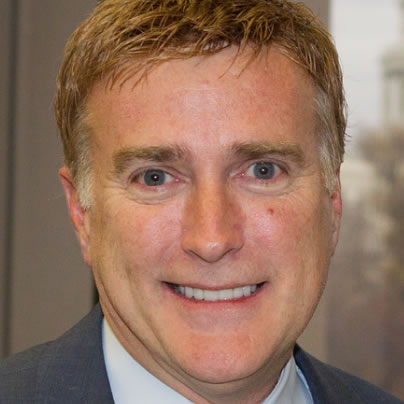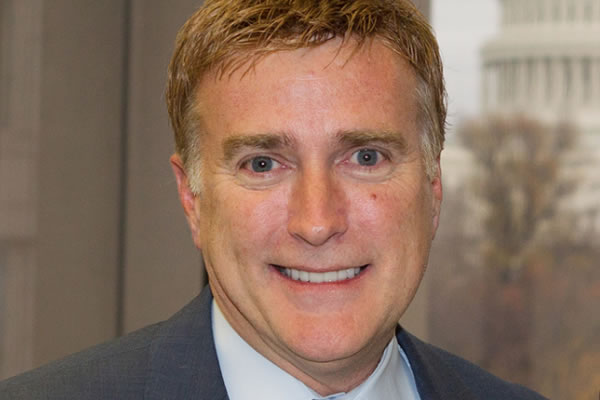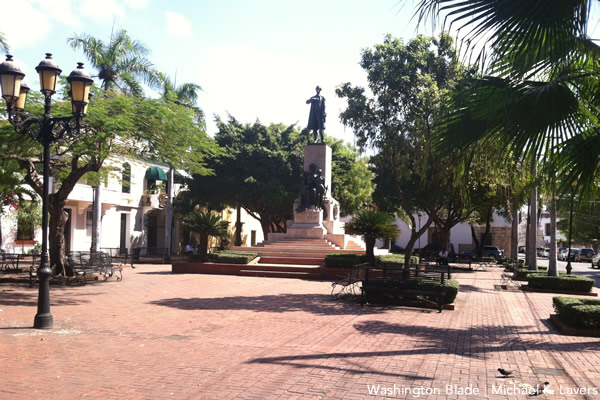National
Gay U.S. ambassador brings hope to Dominican advocates
James ‘Wally’ Brewster is ‘from our community’

SANTO DOMINGO, Dominican Republic – Dominican LGBT rights advocates remain hopeful that gay U.S. Ambassador to the Dominican Republic James “Wally” Brewster will continue to generate more visibility around their nascent movement in the Caribbean country.
“In reality the Dominican LGBT community is not a rather large community,” Cristian King of Trans Siempre Amigas told the Washington Blade on March 7 during a meeting with nearly a dozen Dominican LGBT rights advocates at the home of Deivis Ventura of the Amigos Siempre Amigos Network of Volunteers in the San Carlos neighborhood of the Dominican capital. “[Brewster] is a person from our community. It is a big impact.”
King spoke with the Blade alongside Amigos Siempre Amigos Executive Director Leonardo Sánchez, radio host Franklyn Sánchez, Edward Tavarez da Silva of the website Zona VIP, Lorena Espinosa of the Woman and Health Colective, Marinela Carvajal of Republika Libre, Anyi Fermin of the Metropolitan Community Church of Santo Domingo’s Women’s Ministry, Pedro Mercedes, Stephanía Hernández of Gente Activa y Participativa, Dominic Rincon of University Students for Diversity and Marta Arredondo of Amigos Siempre Amigos. Ventura is among the seven Latin American LGBT rights advocates who visited the U.S. earlier this year as part of the State Department’s International Visitor Leadership Program.
Espinosa told the Blade that Brewster “helps us a lot.” Carvajal added the gay U.S. ambassador has brought more visibility to the Dominican LGBT rights movement.
“There is more discussion of [LGBT] issues,” said Carvajal. “There has been an opportunity to highlight our issues.”
The U.S. Senate last November confirmed Brewster as ambassador to the Caribbean nation.
Brewster, who is a former member of the Human Rights Campaign board of directors, introduced his husband, Bob Satawake, in a video to the Dominican people shortly after his confirmation. The two men met with Carvajal, King and other Dominican LGBT rights advocates last month at the U.S. Embassy in Santo Domingo.
The State Department said Brewster was unavailable to speak with the Blade in Santo Domingo. He and Satawake gave an exclusive interview to Ritmo Social, a society magazine published by Listín Diario, a conservative Dominican newspaper, in January.
“I was chosen by President Obama to represent his government and the American people as a reflection of our country, its diversity and its mission. I am committed to serving this ideal,” said Brewster. “President Obama was aware of our understanding of the Dominican Republic and knew that we were going to work diligently to advance the extraordinary relationship between our two countries and people.”
Brewster continues to face criticism from Dominican religious figures who oppose his ambassadorship because of his sexual orientation.
Cardinal Nicolás de Jesús López Rodríguez of the Archdiocese of Santo Domingo last June referred to Brewster as a “maricón” or “faggot” in Spanish during a press conference. Rev. Luís Rosario of the Santo Domingo Youth Ministry last month said he feels the gay ambassador is a “bad example” for Dominican society and families.
Archbishop Jude Thaddeus Okolo, the Vatican’s envoy to the Dominican Republic, cited the country’s Constitution that defines marriage as between a man and a woman as the reason he declined to invite Satawake to a diplomatic reception with Dominican President Danilo Medina that was scheduled to take place in January. The event was cancelled after a number of ambassadors said they would not attend because Okolo did not invite Brewster’s husband.
Hernández noted to the Blade a group of Brewster’s opponents dress in black each Monday to protest “the homosexual ambassador.”
“We are defending a person who is homosexual, that is gay and has come to occupy his country’s public position in the Dominican Republic,” said Ventura. “We are defending the right that we have to occupy public positions equally as gay, lesbian, bisexual and trans people. This is why we are defending Wally.”
LGBT Dominicans becoming more visible
The activists with whom the Blade spoke in Santo Domingo insist the country has slowly become more open and accepting of LGBT people.
Parque Duarte in Santo Domingo’s Colonial City remains Santo Domingo’s de facto LGBT community center. Hundreds of LGBT people gather on weekend nights in spite of López and some neighbors’ efforts to ban them from the square that is across the street from a church.
Listín Diario, which announced on Saturday that López will have a weekly column in the newspaper, in 2010 published an article with the headline “Parque Duarte is a center of promiscuity” that outlined “homosexuals, prostitutes and drug users have invaded it.” The newspaper also ran a picture of two trans women kissing.
A number of young gender non-conforming Dominican men on a recent Saturday night were dancing at Fogoo Discotec, a gay nightclub in Santo Domingo’s Colonial City that is across the street from the gay-owned Adam Suites Hotel. Middle-class Dominicans and visitors typically frequent Esedeku and other nearby gay and lesbian bars and clubs.
Listín Diario and Ritmo Social earlier this month published pictures of Brewster and Satawake at an Elton John concert they attended at Altos de Chavón near Casa de Campo on Feb. 28. King told the Blade that Dominicans are increasingly aware of their advocacy efforts because newspapers and other media outlets reach out to them for comment on LGBT-specific issues.
“We are in the press,” he said. “With any gay problem that has to do with the community, the press reaches out to us. We are the community’s spokesperson.”
Serious problems persist for LGBT Dominicans in spite of increased visibility since Brewster assumed his post.
Espinosa and other advocates with whom the Blade spoke pointed out López and others with close ties to the Catholic Church continue to discriminate against LGBT Dominicans, Haitians and other marginalized groups in the country.
“The Catholic Church constantly rebukes us,” said Hernández. “If you are gay, you’re discriminated against. If you’re trans, you’re discriminated against. If you’re poor, you’re discriminated against.”
Hernández told the Blade that trans Dominicans continue to suffer violence from the police and a lack of access to health care. She noted staff at a clinic frequently treats her as though she is a man, even though her gender identity is female and she lives as a woman.
“They call me by the man’s name that is on my documents,” said Hernández. “I make a scene. I reclaim my rights. But there are others who do not reclaim their rights. These people that need to go to a health service. What do they do? The don’t seek the service.”
LGBT advocacy groups receive the bulk of their funds from the U.S. and Europe through HIV/AIDS prevention programs and human rights initiatives.
Hernández and others noted the Catholic Church continues to block any efforts to expand access to condoms and contraception in the country. Dominican lawmakers in 2009 approved a constitutional amendment banning abortion that then-President Leonel Fernández introduced with the church’s support.
“The Dominican government does not give one peso to any LGBT group,” Ventura told the Blade.
Ventura added wealthy gay Dominicans who own businesses in Miami and other cities have also not contributed to Dominican LGBT rights organizations. One gay man with whom the Blade spoke at Esedequ said he was not familiar with their work.
“They are not going to donate a peso to the community,” said Ventura.
The White House
Four states to ignore new Title IX rules protecting transgender students
Biden administration last Friday released final regulations

BY ERIN REED | Last Friday, the Biden administration released its final Title IX rules, which include protections for LGBTQ students by clarifying that Title IX forbids discrimination based on sexual orientation and gender identity.
The rule change could have a significant impact as it would supersede bathroom bans and other discriminatory policies that have become increasingly common in Republican states within the U.S.
As of Thursday morning, however, officials in at least four states — Oklahoma, Louisiana, Florida, and South Carolina — have directed schools to ignore the regulations, potentially setting up a federal showdown that may ultimately end up in a protracted court battle in the lead-up to the 2024 elections.
Louisiana State Superintendent of Education Cade Brumley was the first to respond, decrying the fact that the new Title IX regulations could block teachers and other students from exercising what has been dubbed by some a “right to bully” transgender students by using their old names and pronouns intentionally.
Asserting that Title IX law does not protect trans and queer students, Brumley states that schools “should not alter policies or procedures at this time.” Critically, several courts have ruled that trans and queer students are protected by Title IX, including the 4th U.S. Circuit Court of Appeals in a recent case in West Virginia.
In South Carolina, Schools Supt. Ellen Weaver wrote in a letter that providing protections for trans and LGBTQ students under Title IX “would rescind 50 years of progress and equality of opportunity by putting girls and women at a disadvantage in the educational arena,” apparently leaving trans kids out of her definition of those who deserve progress and equality of opportunity.
She then directed schools to ignore the new directive while waiting for court challenges. While South Carolina does not have a bathroom ban or statewide “Don’t Say Gay or Trans” law, such bills continue to be proposed in the state.
Responding to the South Carolina letter, Chase Glenn of Alliance For Full Acceptance stated, “While Supt. Weaver may not personally support the rights of LGBTQ+ students, she has the responsibility as the top school leader in our state to ensure that all students have equal rights and protections, and a safe place to learn and be themselves. The flagrant disregard shown for the Title IX rule tells me that our superintendent unfortunately does not have the best interests of all students in mind.”
Florida Education Commissioner Manny Diaz also joined in instructing schools not to implement Title IX regulations. In a letter issued to area schools, Diaz stated that the new Title IX regulations were tantamount to “gaslighting the country into believing that biological sex no longer has any meaning.”
Governor Ron DeSantis approved of the letter and stated that Florida “will not comply.” Florida has notably been the site of some of the most viciously anti-queer and anti-trans legislation in recent history, including a “Don’t Say Gay or Trans” law that was used to force a trans female teacher to go by “Mr.”
State Education Supt. Ryan Walters of Oklahoma was the latest to echo similar sentiments. Walters has recently appointed the right-wing media figure Chaya Raichik of Libs of TikTok to an advisory role “to improve school safety,” and notably, Raichik has posed proudly with papers accusing her of instigating bomb threats with her incendiary posts about LGBTQ people in classrooms.
The Title IX policies have been universally applauded by large LGBTQ rights organizations in the U.S. Lambda Legal, a key figure in fighting anti-LGBTQ legislation nationwide, said that the regulations “clearly cover LGBTQ+ students, as well as survivors and pregnant and parenting students across race and gender identity.” The Human Rights Campaign also praised the rule, stating, “rule will be life-changing for so many LGBTQ+ youth and help ensure LGBTQ+ students can receive the same educational experience as their peers: Going to dances, safely using the restroom, and writing stories that tell the truth about their own lives.”
The rule is slated to go into effect Aug. 1, pending any legal challenges.
****************************************************************************

Erin Reed is a transgender woman (she/her pronouns) and researcher who tracks anti-LGBTQ+ legislation around the world and helps people become better advocates for their queer family, friends, colleagues, and community. Reed also is a social media consultant and public speaker.
******************************************************************************************
The preceding article was first published at Erin In The Morning and is republished with permission.
Pennsylvania
Malcolm Kenyatta could become the first LGBTQ statewide elected official in Pa.
State lawmaker a prominent Biden-Harris 2024 reelection campaign surrogate

Following his win in the Democratic primary contest on Wednesday, Pennsylvania state Rep. Malcolm Kenyatta, who is running for auditor general, is positioned to potentially become the first openly LGBTQ elected official serving the commonwealth.
In a statement celebrating his victory, LGBTQ+ Victory Fund President Annise Parker said, “Pennsylvanians trust Malcolm Kenyatta to be their watchdog as auditor general because that’s exactly what he’s been as a legislator.”
“LGBTQ+ Victory Fund is all in for Malcolm, because we know he has the experience to win this race and carry on his fight for students, seniors and workers as Pennsylvania’s auditor general,” she said.
Parker added, “LGBTQ+ Americans are severely underrepresented in public office and the numbers are even worse for Black LGBTQ+ representation. I look forward to doing everything I can to mobilize LGBTQ+ Pennsylvanians and our allies to get out and vote for Malcolm this November so we can make history.”
In April 2023, Kenyatta was appointed by the White House to serve as director of the Presidential Advisory Commission on Advancing Educational Equity, Excellence and Economic Opportunity for Black Americans.
He has been an active surrogate in the Biden-Harris 2024 reelection campaign.
The White House
White House debuts action plan targeting pollutants in drinking water
Same-sex couples face higher risk from environmental hazards

Headlining an Earth Day event in Northern Virginia’s Prince William Forest on Monday, President Joe Biden announced the disbursement of $7 billion in new grants for solar projects and warned of his Republican opponent’s plans to roll back the progress his administration has made toward addressing the harms of climate change.
The administration has led more than 500 programs geared toward communities most impacted by health and safety hazards like pollution and extreme weather events.
In a statement to the Washington Blade on Wednesday, Brenda Mallory, chair of the White House Council on Environmental Quality, said, “President Biden is leading the most ambitious climate, conservation, and environmental justice agenda in history — and that means working toward a future where all people can breathe clean air, drink clean water, and live in a healthy community.”
“This Earth Week, the Biden-Harris Administration announced $7 billion in solar energy projects for over 900,000 households in disadvantaged communities while creating hundreds of thousands of clean energy jobs, which are being made more accessible by the American Climate Corps,” she said. “President Biden is delivering on his promise to help protect all communities from the impacts of climate change — including the LGBTQI+ community — and that we leave no community behind as we build an equitable and inclusive clean energy economy for all.”
Recent milestones in the administration’s climate policies include the U.S. Environmental Protection Agency’s issuance on April 10 of legally enforceable standard for detecting and treating drinking water contaminated with polyfluoroalkyl substances.
“This rule sets health safeguards and will require public water systems to monitor and reduce the levels of PFAS in our nation’s drinking water, and notify the public of any exceedances of those levels,” according to a White House fact sheet. “The rule sets drinking water limits for five individual PFAS, including the most frequently found PFOA and PFOS.”
The move is expected to protect 100 million Americans from exposure to the “forever chemicals,” which have been linked to severe health problems including cancers, liver and heart damage, and developmental impacts in children.
An interactive dashboard from the United States Geological Survey shows the concentrations of polyfluoroalkyl substances in tapwater are highest in urban areas with dense populations, including cities like New York and Los Angeles.
During Biden’s tenure, the federal government has launched more than 500 programs that are geared toward investing in the communities most impacted by climate change, whether the harms may arise from chemical pollutants, extreme weather events, or other causes.
New research by the Williams Institute at the UCLA School of Law found that because LGBTQ Americans are likelier to live in coastal areas and densely populated cities, households with same-sex couples are likelier to experience the adverse effects of climate change.
The report notes that previous research, including a study that used “national Census data on same-sex households by census tract combined with data on hazardous air pollutants (HAPs) from the National Air Toxics Assessment” to model “the relationship between same-sex households and risk of cancer and respiratory illness” found “that higher prevalence of same-sex households is associated with higher risks for these diseases.”
“Climate change action plans at federal, state, and local levels, including disaster preparedness, response, and recovery plans, must be inclusive and address the specific needs and vulnerabilities facing LGBT people,” the Williams Institute wrote.
With respect to polyfluoroalkyl substances, the EPA’s adoption of new standards follows other federal actions undertaken during the Biden-Harris administration to protect firefighters and healthcare workers, test for and clean up pollution, and phase out or reduce use of the chemicals in fire suppressants, food packaging, and federal procurement.
-

 District of Columbia3 days ago
District of Columbia3 days agoCatching up with the asexuals and aromantics of D.C.
-

 State Department5 days ago
State Department5 days agoState Department releases annual human rights report
-

 South America3 days ago
South America3 days agoArgentina government dismisses transgender public sector employees
-

 Maine4 days ago
Maine4 days agoMaine governor signs transgender, abortion sanctuary bill into law












